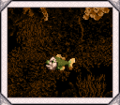Koco: Difference between revisions
No edit summary |
TheRaoul1992 (talk | contribs) |
||
| Line 18: | Line 18: | ||
Koco DKLIII sprite.png|''Donkey Kong Land III'' sprite | Koco DKLIII sprite.png|''Donkey Kong Land III'' sprite | ||
Koco DKL3c sprite.png|''Donkey Kong GB: Dinky Kong & Dixie Kong'' sprite | Koco DKL3c sprite.png|''Donkey Kong GB: Dinky Kong & Dixie Kong'' sprite | ||
Koco DKC3 GBA green.png|''Donkey Kong Country 3'' (GBA) sprite (green) | |||
</gallery> | </gallery> | ||
Revision as of 10:54, August 23, 2021
Template:Species-infobox Template:Quote2 Kocos are fish enemies that first appear in Donkey Kong Country 3: Dixie Kong's Double Trouble!, where they are one of the most common underwater enemies. They are based on the literal interpretation of a clownfish, as shown from their face paint and big red nose, and their name likely refers to the classic cartoon character Koko the Clown. Like Cheep Cheeps of the Mario franchise, there are both red and green Kocos, whose behavior is determined by their color. Green Kocos are either stationary or move in one direction, while the red ones swim back and forth in an area. In underwater levels, there are also red Kocos that swim nonstop in a single direction. In the Game Boy Advance remake, their roles were reversed.
Like other underwater enemies, Kocos can only be defeated if Enguarde stabs them. In the level Fish Food Frenzy, Dixie and Kiddy are required to guide Nibbla into eating Kocos to prevent it from becoming angry and biting them. In Dixie Kong's Photo Album, Kocos are classified under the "Aquatic Attackers" enemy class.
Kocos also appear in Donkey Kong Land III and retain their appearance and role from Donkey Kong Country 3: Dixie Kong's Double Trouble!. Only red Kocos appear in the game (as shown from their behavior), which is more evident in the Game Boy Color port, where their sprites are red. Two red Kocos appear on the game's box art.
Gallery
A green Koco, as seen in Dixie Kong's Photo Album
Names in other languages
| Language | Name | Meaning | Notes |
|---|---|---|---|
| Japanese | ココ[?] Koko |
Koco |



